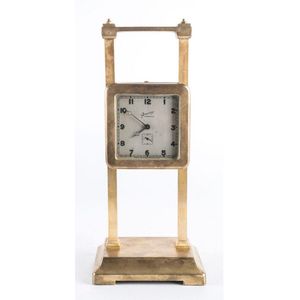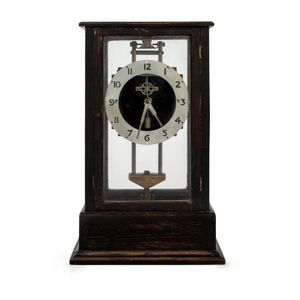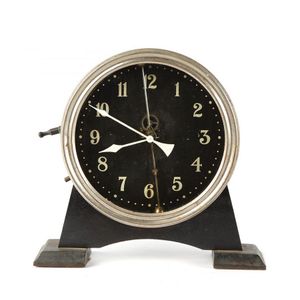
Ansonia Gravity Clock - Circa 1919
Ansonia Gravity clock, gilt metal case, circa 1919, 10.24 in. high

Bronzed Ansonia Gravity Clock, 1919
Ansonia Gravity clock, bronzed metal case, circa 1919, 10.24 in. high

Enamel Gravity Wall Clock, 1919
Gravity wall clock with enamel dial, circa 1919, this type of clock was originally used in the mid 18th century. the movement is wound by raising the clock up the rack and allowing it's own weight to drive the mechanism, 24.02 in. high

Gravity Clock in Oak Case, England, c. 1900
Gravity clock in oak case, England, circa 1900, when the movement is elevated a tooth rack on one of the columns is engaged and the movements own weight will drive the clock for 24 hours, 13.78 in. high

Brass Gravity Clock, Circa 1900
English gravity clock in brass case, circa 1900, 10.24 in. high

Brass Gravity Timepiece by Watson & Webb, c.1920
A gravity timepiece, brass, c.1920. Brass cased circular movement slides on two vertical columns descending from top to bottom in 30 hours and rewound daily by raising the movement to the top. The mechanism uses a compound pendulum with two small brass sph

Steel Gravity Timepiece with Visible Escapement Movement
A Gravity Timepiece-Steel, C.1920. Circular steel case with black crackled finish mounted on ebonised wooden base with chrome plated steel bezel. The compound pendulum and visible escapement movement are in front of the dial with white painted Arabic numer

Gravity Tower Clock by Fritz Ziegeler in Melbourne
A Gravity Tower clock, Fritz Ziegeler, Melbourne, the painted cast iron clock housed in a brick surround, gravity escapement, 49.21 in. high, 18.11 in. wide, 23.62 in. deep. Other Notes: Johann Frederick Wilhelm Ziegeler was born in Hanover, Germany in…

Gravity Pendulum Desk Clock - Patented Mechanism
1919 Gravity desk clock, with patented mechanism and internal pendulum. Crack to glass, which has chapter ring. Height 10.24 in.